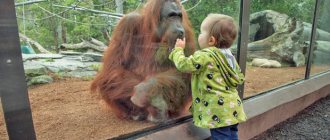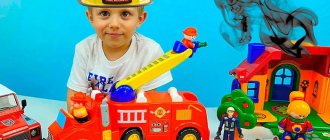Six golden rules
After the improved Tic-Tac-Toe, Alena began to come up with the following games, and in the process she identified seven important rules for herself that will become the key to an interesting and useful game:
- The game is for kids, not adults. To keep children interested, don't make the game too hard or too easy.
- For children it is entertainment, for the teacher it is a tool. The game is not just for fun. And if this is entertainment for children, then the teacher must formulate the goal that he wants to achieve with this activity, for example, to consolidate educational material or develop the logical thinking of children.
- "Squares" is a universal playing field. For an introduction to floor games, the universal playing field “Squares” is perfect: a rectangle made up of 24 squares. The recommended size is 1.4 by 2.8 meters to make it easier for children to move around. You can create the playing field yourself, for example, draw squares with electrical tape on the floor, or you can use ready-made material, for example, banner cloth.
- Game is movement. Think about what the child should do: remove pictures, spin a hoop, jump with a ball. Children love movement, and standing still will be boring for them.
- Rules are the basis of order. Think and clearly explain to children what can be done during the game and what cannot be done. This will make it easier to control the process and achieve didactic goals.
- Everything is good in moderation. To prevent children from getting bored with games, it is optimal to conduct them no more than two or three times a week. The exception is play activity during morning exercises: it is part of an exercise cycle and takes only a few minutes.
Alena came up with a whole series of outdoor games, which were included in her collection “Outdoor Games and Activities for Children,” and shared with us five activities that can easily be done with kids.
Program tasks of gaming activities
Yana Vasilyeva
Program tasks of gaming activities
Development of gaming activities
Second group of early age (2-3 years)
Role-playing games. Teach children to show interest in the playful activities of their peers; help play nearby, do not interfere with each other.
Learn to perform several actions with one object and transfer familiar actions from one object to another; with the help of an adult, perform several game actions united by a plot outline. Promote children’s desire to independently select toys and attributes for play, and use substitute items.
Lead children to understand the role in the game. Form initial skills of role behavior; learn to connect plot actions with the role.
Develop the prerequisites for creativity.
Outdoor games. To develop in children a desire to play outdoor games with simple content together with the teacher. Get used to playing together in small groups. Support games that improve movement (walking, running, throwing, rolling)
.
Theatrical games. Arouse interest in theatrical play through the first experience of communicating with a character (the Katya doll shows
concert, expanding contacts with adults (grandmother invites you to the village yard)
.
Encourage children to respond to games-actions with sounds (living and inanimate nature, imitate the movements of animals and birds to music, to the sound of a word (in works of small folklore forms)
.
Promote the manifestation of independence and activity in playing with toy characters.
Create conditions for the systematic perception of theatrical performances of the pedagogical theater (adults)
.
Didactic games. To enrich children’s sensory experience in games with didactic material. Consolidate knowledge about the size, shape, color of objects. Learn to assemble a pyramid (tower)
of 5–8 rings of different sizes; navigate the relationships between plane figures
“Geometric mosaic”
(circle, triangle, square, rectangle)
;
make a whole from four parts (cut pictures, folding cubes)
;
compare, correlate, group, establish the identity and difference of homogeneous objects according to one of the sensory attributes (color, shape, size)
.
Conduct didactic games to develop attention and memory ( “What’s missing?”
and so on.);
auditory differentiation ( “What sounds?”
, etc.);
tactile sensations, temperature differences ( “Wonderful bag”
,
"Warm - cold"
,
“Light - heavy”,
etc.);
fine motor skills (toys with buttons, hooks, zippers, lacing, etc.)
.
Junior group (3-4 years old)
Role-playing games. To encourage children to develop games on themes from life around them, based on literary works (rhymes, songs, fairy tales, poems)
;
enriching gaming experience by combining individual actions into a single storyline.
Develop the ability to choose a role, perform several interrelated actions while playing with toys (cook dinner, set the table, feed)
.
Learn to interact in stories with two characters (driver - passenger, mother - daughter, doctor - patient)
; in individual games with substitute toys, play the role for yourself and for the toy.
Show ways of role-playing behavior using educational games. Encourage children to try to independently select attributes for a particular role; supplement the game environment with missing items,
toys.
To complicate and enrich the subject-game environment through the use of multifunctional items and an increase in the number
toys. Teach children to use building materials in games (cubes, bars, plates, simple wooden and plastic construction sets, natural materials (sand, snow, water)
; act with them in a variety of ways (build a slide for dolls, a bridge, a road; sculpt a fence or house out of snow; float toys on water).
Develop the ability to interact and get along with each other in short-term joint games.
Outdoor games. To develop children’s activity in motor activities . Organize games with all the children in the group. Encourage games with wheelchairs, cars, carts, bicycles; games that develop climbing and crawling skills; games with balls, spheres, developing dexterity of movements.
Gradually introduce games with more complex rules and changing types of movements.
Theatrical games. Arouse children's interest in theatrical play, create conditions for its implementation. To develop the ability to follow the development of action in dramatization games and puppet shows created by adults and older children.
Teach children to imitate the characteristic actions of characters (birds fly, a kid jumps, convey the emotional state of a person (facial expressions, posture, gesture, movement)
.
Introduce children to the techniques of driving tabletop dolls. Learn to accompany movements with a simple song.
Create a desire to act with costume elements (hats, collars, etc.)
and attributes as external symbols of the role.
Develop the desire to improvise on simple plots of songs and fairy tales. Create a desire to perform in front of dolls and peers,
arranging the venue for the performance.
Encourage participation in conversations about the theater (theater - actors - spectators, behavior of people in the auditorium)
.
Didactic games. Strengthen children’s ability to select objects by color and size (large, medium and small balls of 2-3 colors, assemble a pyramid of rings of decreasing size, alternating 2-3 colors in a certain sequence. Teach to assemble a picture from 4-6 parts ( “ Our dishes"
,
“Toys”
, etc.).
In joint didactic games, teach children to follow gradually more complex rules.
Middle group (4 -5 years old)
Role-playing games. Continue working with children to develop and enrich the plots of games; Using indirect methods of guidance, lead children to independently create game plans .
In joint games with the teacher, containing 2-3 roles, improve the children’s ability to unite in the game, distribute roles (mother, father, children, perform game actions , act in accordance with the rules and the general game plan .
Learn to select objects and attributes for the game.
Develop the ability to use buildings made from building materials in a role-playing game. Encourage children to create buildings of varying structural complexity (for example, a garage for several cars, a house of 2-3 floors, a wide bridge for the passage of cars or trains going in two directions, etc.).
Teach children to agree on what they will build, distribute material among themselves, coordinate actions and achieve results through joint efforts.
Nurture friendly relationships between children, develop the ability to take into account the interests of comrades.
Expand the scope of children’s independent actions in choosing a role, developing and implementing a plan, and using attributes; develop the social relationships of those playing by understanding the professional activities of adults .
Outdoor games. Continue to develop physical activity; agility, speed, spatial orientation.
To foster children's independence in organizing familiar games with a small group of peers.
Train yourself to follow rules independently.
Develop children’s creative abilities in games (inventing game options, combining movements)
.
Theatrical games. Continue to develop and maintain children’s interest in theatrical play by acquiring more complex gaming skills (the ability to perceive an artistic image, monitor the development and interaction of characters).
Conduct studies to develop the necessary mental qualities (perception, imagination, attention, thinking, performance skills (role-playing, ability to act in an imaginary plan)
and sensations (muscular, sensory, using musical, verbal, visual images.
Teach children to perform simple performances based on familiar literary works; use to embody an image
known means of expression (intonation, facial expressions, gesture)
.
Encourage children to show initiative and independence in choosing a role, plot, and means of transformation; provide the opportunity for experimentation when creating the same image.
To learn to feel and understand the emotional state of the hero, to enter into role-playing interactions with other characters.
To promote the diversified development of children in theatrical activities by tracking the number and nature of the roles performed by each child.
Promote the further development of director's play by providing space, play materials and the opportunity for several children to join together for long periods of play.
To teach the use of figurative toys and bibabo, independently sculpted figures from clay, plastic, plasticine, and toys from Kinder surprises in theatrical games.
Continue to use the capabilities of the pedagogical theater (for adults)
for the accumulation of emotional and sensory experience, for children to understand the complex of expressive means used in the performance.
Didactic games. Learn to play didactic games aimed at consolidating ideas about the properties of objects, improving the ability to compare objects by external characteristics, group, and make a whole from parts (cubes, mosaics, puzzles)
.
Improve tactile, auditory, and taste sensations (“Identify by touch (by taste, by sound)
").
Develop observation and attention ( “What has changed”
,
“Who has the ring”
).
Encourage the desire to master the rules of the simplest board games ( “Domino”
,
"Lotto"
).
Senior group (5-6 years old)
Role-playing games. Improve and expand play ideas and skills. Develop a desire to organize role-playing games.
Encourage the choice of a theme for the game; teach to develop a plot based on knowledge gained from the perception of the environment, from literary works and television programs, excursions, exhibitions, travel, hikes.
Teach children to agree on the theme of the game; distribute roles, prepare the necessary conditions, agree on the sequence of joint actions, establish and regulate contacts in a joint game: negotiate, reconcile, give in, convince, etc. Learn to independently resolve conflicts that arise during the game. Contribute to the strengthening of sustainable children's play associations .
Continue to develop the ability to coordinate your actions with
actions of partners, observe role interactions and relationships in the game. Develop emotions that arise during role-playing and plot game actions with characters.
Learn to complicate the game by expanding the composition of roles, coordinating and predicting role actions and behavior in accordance with the plot of the game, and increasing the number of combined storylines.
Contribute to enriching a familiar game with new solutions (participation of an adult, changing attributes, introducing substitute items or introducing a new role). Create conditions for creative self-expression; for the emergence of new games and their development.
Teach children to collectively build buildings necessary for the game, plan upcoming work, and carry out their plans together. Learn to apply constructive skills acquired in class.
Form the habit of carefully putting toys away in the designated place.
Outdoor games. Continue to teach children to independently organize familiar outdoor games; participate in games with competitive elements. Introduce folk games.
Cultivate honesty and fairness in independent games with peers.
Theatrical games. Continue to develop interest in
theatrical play by actively involving children in play activities . Create a desire to try yourself in different roles.
To complicate the game material by presenting more and more promising ones to the children (from the point of view of dramaturgy)
artistic
tasks ( “You were poor Cinderella, and now you are a beautiful princess”
,
“This role has not yet been revealed to anyone”
, changing tactics of working on
a game or performance.
Create an atmosphere of creativity and trust, giving each child the opportunity to speak out about the preparation for the performance and the process of the game.
Teach children to create creative groups to prepare and conduct performances and concerts, using all available opportunities.
Learn to build a line of behavior in a role using attributes and costume details made with your own hands.
Encourage improvisation and the ability to feel free in a role. To cultivate artistic qualities, to reveal the creative potential of children, involving them in various theatrical performances: concert games, circus, showing scenes from plays. Provide opportunities for children to perform in front of peers, parents, and others
guests.
Didactic games. Organize didactic games, uniting children into subgroups of 2–4 people; learn to follow the rules of the game.
Develop memory, attention, imagination, thinking, speech, sensory abilities of children. Learn to compare objects, notice minor differences in their characteristics (color, shape, size, material, combine objects according to common characteristics, make a whole from parts (folding cubes, mosaics, puzzles, identify changes in the arrangement of objects (front, back, right, left) , under, above, in the middle, on the side)
.
To develop a desire to act with a variety of educational games and toys (folk, electronic, computer games, etc.)
.
Encourage children to be independent in the game, causing them to have an emotionally positive response to the game action .
Teach to obey the rules in group games. Foster creative independence. Develop qualities such as friendliness and discipline. Foster a culture of fair competition in competitive games.
School preparatory group (6-7 years old)
Continue to develop children's independence in organizing all types of games, following rules and norms of behavior.
Develop initiative and organizational skills. Foster a sense of teamwork.
Role-playing games. Continue to teach children to take on different roles in accordance with the plot of the game; use attributes, constructors, building materials.
Encourage children to organize their own game in their own way, independently select and create the items missing for the game (tickets for playing in the theater, money for shopping)
.
To promote the creative use in games of ideas about the surrounding life, impressions of works of literature, and cartoons.
Develop creative imagination, the ability to develop a game together, coordinating your own game plan with the plans of your peers; continue to develop the ability to negotiate, plan and discuss the actions of all players.
Form relationships based on cooperation and mutual assistance. Cultivate goodwill and willingness to help a peer; the ability to take into account the interests and opinions of fellow players and resolve disputes fairly.
Outdoor games. Teach children to use outdoor games of various content in their independent activities. Conduct games with elements of competition that promote the development of physical qualities (dexterity, speed, endurance, coordination of movements, ability to navigate in space.
Learn to fairly evaluate the results of the game.
Develop interest in sports (badminton, basketball, table tennis, hockey, football)
and folk games.
Theatrical games. To develop children's independence in organizing theatrical games.
Improve the ability to independently choose a fairy tale,
poem, song for production; prepare the necessary attributes and scenery for the future performance; distribute responsibilities and roles among themselves.
Develop creative independence, aesthetic taste in conveying an image; artistic skills. Learn to use means of expression (posture, gestures, facial expressions, intonation, movements)
.
Cultivate a love of theater. Widely use different types of theater in children's theatrical activities (bibabo, finger theater, cup theater, picture theater, glove theater, puppet theater, etc.).
To develop the skills of theatrical culture, to introduce them to theatrical and musical art through watching theatrical performances and video materials. Tell children about the theater and theatrical professions.
Learn to comprehend artistic images created by means of theatrical expressiveness (lighting, makeup, music, words, choreography, scenery, etc.)
.
Didactic games. Continue teaching children to play various educational games (lotto, mosaic, spillikins, etc.)
. Develop the ability to organize games and play the role of a leader.
Learn to coordinate your actions with the actions of the leader and other participants in the game. Develop intelligence in the game, the ability to independently solve a given problem .
Involve children in creating some didactic games ( “Noisemakers”
,
“Rustlers”
, etc.). Develop and consolidate sensory abilities. Promote the manifestation and development in the game of qualities necessary for preparing for school: voluntary behavior, associative figurative
and logical thinking, imagination, cognitive activity.








